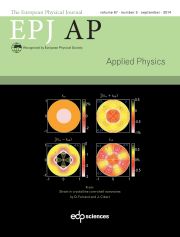No CrossRef data available.
Article contents
On the robust control of an induction machine: A complete design and realization
Published online by Cambridge University Press: 15 April 1999
Abstract
Electrical traction of vehicle needs accurate control of torque and flux. DC machinesare Maynly used but they are expensive and need heavy Mayntenance. Since some years,the use of field oriented vector control induction machines allows to fulfill the sameobjectives with lower cost. Unfortunately, they may present a decrease of their performances and an instability when their parameters vary with the temperature or the magnetic state and in the presence of converter or measurement noises. Therefore it isnecessary to design effective control laws, which are especially less sensitive to these perturbations and variations. In this work, we have undertaken the conception andthe realization of a voltage vector flux control whose inputs have been uncoupled bycompensating terms. The torque and the flux regulations are realized at two differentlevels: an internal regulation loop for stator currents, and an external one for fluxand torque. In order to achieve robust stability and performance objectives, we haveinvolved several new methods in the doMayn such as H ∞ control designed bygenetic algorithms and reduced order extended Kalman filtering in the synchronousframe. Simulations will show the method efficiency and experimental results validatethe control strategy.
- Type
- Research Article
- Information
- Copyright
- © EDP Sciences, 1999


